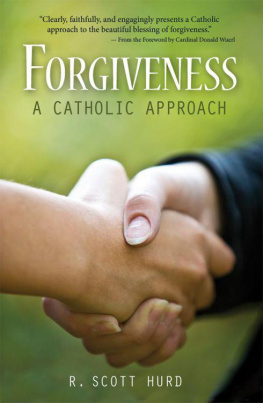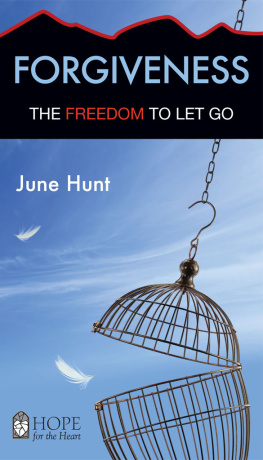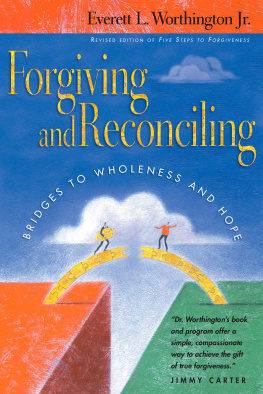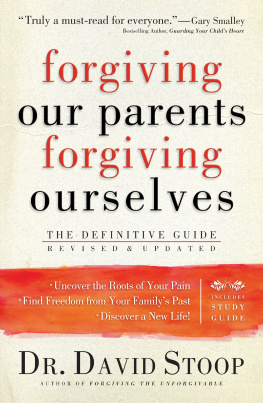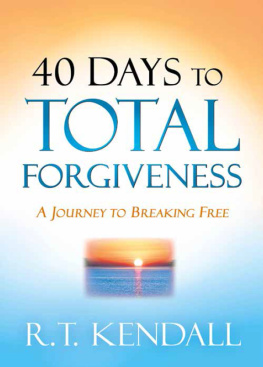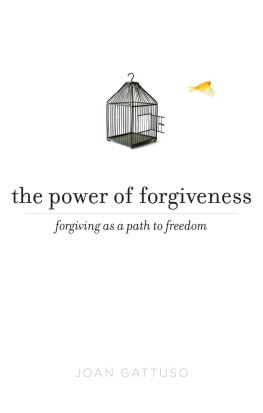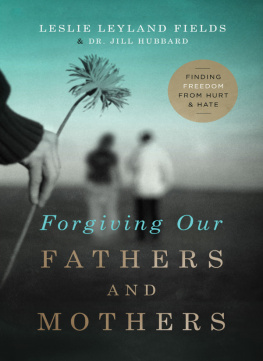FORGIVENESS
FORGIVENESS
A CATHOLIC APPROACH
R. Scott Hurd
Foreword by Cardinal Donald Wuerl

Library of Congress Cataloging-in-Publication Data
Hurd, R. Scott.
Forgiveness: a Catholic approach / R. Scott Hurd; foreword by Donald Wuerl.
p. cm.
ISBN-10: 0-8198-2691-X
Mobi ISBN-10: 0-8198-2703-7
ePub ISBN-10: 0-8198-2704-5
1. ForgivenessReligious aspectsCatholic Church. 2. Forgiveness of sin.
I. Title.
BV4647.F55H865 2011
241.4dc22
2011009002
Many manufacturers and sellers distinguish their products through the use of trademarks. Any trademarked designations that appear in this book are used in good faith but are not authorized by, associated with, or sponsored by the trademark owners.
Some Scripture quotations contained herein are from the New Revised Standard Version Bible: Catholic Edition, copyright 1989, 1993, Division of Christian Education of the National Council of the Churches of Christ in the United States of America. Used by permission. All rights reserved.
Some Scripture texts in this work are taken from the New American Bible with Revised New Testament and Revised Psalms 1991, 1986, 1970, Confraternity of Christian Doctrine, Washington, D.C. and are used by permission of the copyright owner. All rights reserved. No part of the New American Bible may be reproduced in any form without permission in writing from the copyright owner.
One Scripture quotation is taken from the Contemporary English Version Bible .
Cover design by Rosana Usselmann
Cover photo: istockphoto.com
All rights reserved. No part of this book may be reproduced or transmitted in any form or by any means, electronic or mechanical, including photocopying, recording, or by any information storage and retrieval system, without permission in writing from the publisher.
P and PAULINE are registered trademarks of the Daughters of St. Paul.
Copyright 2011, R. Scott Hurd
Published by Pauline Books & Media, 50 Saint Pauls Avenue, Boston, MA 02130-3491
www.pauline.org
Pauline Books & Media is the publishing house of the Daughters of St. Paul, an international congregation of women religious serving the Church with the communications media.
For Steph, my wife,
God only knows where Id be without you
Contents
Forgiveness can be difficult, but it is a beautiful gift of love.
Forgiving benefits us physically, spiritually, and relationally.
Our forgiveness blesses those we forgive, and indeed all those around us.
Forgiveness glorifies God and reveals his love to the world.
Forgiveness isnt fair. Its an expression of love and mercy.
Everyone is a candidate for forgiveness no matter what theyve done.
Christian forgiveness is unconditional and unlimited.
We cant forgive and forget. But we can forgive and let go.
Forgiving another doesnt condone what was done to us.
We can always forgive, but we cant always reconcile.
Radical forgiveness is possible only with Gods grace.
Prayer is essential to forgiveness.
To forgive others, first seek Gods forgiveness.
The role of Confession in forgiveness.
The role of the Eucharist in forgiveness.
To forgive others, we must forgive ourselves.
Seeking to understand and empathize with our offender.
Lowering our expectations of others helps us forgive them.
Did we play a role in the situation that led to our hurt?
Understanding anger and its purpose.
The benefits of sharing our feelings and experiences with another.
Forgiveness requires patience and time.
Signs of authentic and successful forgiveness.
Whether we forgive or not determines the person we become.
Practical steps to take when we need to forgive.
Courage, child, your sins are forgiven (Mt 9:2). These powerful, consoling, healing, and restoring words addressed to the paralytic in Matthews Gospel are directed also to each of us.
The sacrament of Reconciliation is the story of Gods love that never turns away from us. Gods love endures even our shortsightedness and selfishness. Like the father in the parable of the Prodigal Son, God awaits and watches and hopes for our return every time we walk away. Like the son in the same parable, all we need to do to make our way to our Father is to recognize our wrong, our need, and Gods love.
But we are called to even more than the passive reception of Gods mercy. Jesus asks us to be instruments of forgiveness. Forgive us our trespasses, as we forgive those who trespass against us (Mt 6:12). We who so generously receive the gift of Gods mercy and forgiveness are expected to share as graciously with those who have offended us. In all of the petitions of the Lords Prayer, this is the only one that carries with it a condition. We should expect our forgiveness to be measured by the gauge of our own mercy.
In Forgiveness: A Catholic Approach , Father R. Scott Hurd writes of the spiritual, psychological, physical, and social benefits of learning how to forgive and find peace. Drawing from his pastoral experience, in twenty-four short chapters, Father Hurd examines how human weakness affects such things as our ability to forgive and reconcile, our capacity to trust, and how we cope when a plea for forgiveness is rejected by a person we have wronged. We learn that through these very experiences, we find in Jesus Christ and the sacraments a way to move forward toward healing.
The first question Father Hurd addresses is one that perplexes many people, Why forgive? Here we learn that forgiveness is essential for human growth and flourishing. Forgiveness is not only a human experience, it is also an expression of Gods love and mercy. Forgiveness is at once deeply personal and an opportunity for sharing the Good News. As participants in the New Evangelization, our acts of forgiveness and reconciliation offer people an experience of Gods love. Father Hurd writes, forgiveness from our hearts can turn others hearts toward God (see ).
All of us know that there is more to forgiveness than simply saying Im sorry. In the section entitled, Hallmarks of Forgiveness, Father Hurd deftly outlines seven such marks of forgiveness that reflect the teaching and example of Our Lord. In Jesus, we learn how to forgive others as God has forgiven us. Forgiveness is a decision, a process, and a gift (see ).
Equally challenging today is the question of how to forgive. In Forgiveness: A Catholic Approach we find an entire section on this topic. With priestly wisdom, Father Hurd examines a wide variety of experiences of forgiveness and reconciliation. With examples from Scripture, Church tradition, literature, and his own ministry, he offers a useful ten-step process to aid people ready to make the decision to forgive.
As we seek to grow deeper in our understanding of the meaning of forgiveness in the Catholic tradition, this book is a welcome companion for both meditation and prayer. I am pleased to recommend Forgiveness: A Catholic Approach for readers looking for help in taking the first step toward forgiveness or seeking support in moving from forgiveness to reconciliation. This book is a sure guide because it so clearly, faithfully, and engagingly presents a Catholic approach to the beautiful blessing of forgiveness.
Cardinal Donald Wuerl
Archbishop of Washington
WHY FORGIVE?
A Lovely Idea?
Everyone says that forgiveness is a lovely idea, wrote C. S. Lewis, until they have something to forgive. How true that is! When weve been hurt, forgiving the one who has hurt us may be the last thing we want to do. Were angry. Forgiveness doesnt seem fair. We dont think the ones who have hurt us deserve it. We fear that forgiving them would let them off the hook. In our pain, being told we need to forgive can seem offensive. Maybe weve been hurt often and were just plain tired of forgiving. And thats somewhat understandable: forgiving can be a difficult and painful process that requires large doses of humility and grace. It can seem easier to stay mad or get even rather than let go and move on.

